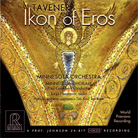December 2003
"Music already exists. Its all been given to us by God…It was breathed into the mouth of man by God…" "…its all about longing." -- Sir John Tavener These words, by the composer of this truly extraordinary work of art, go much farther in explaining what is on this disc than I have any hope of doing. Although Tavener may be right in saying that divine beauty is out of our reach, what he has created here is so profoundly beautiful that a review is akin to describing Monet’s paintings of "Waterlilies" rather than viewing them in person. It is bound to come up severely short. John Taverner has been composing music for over three decades. He first gained popular acclaim when he composed and performed a piece called The Whale that drew the interest of a group called The Beatles, who later recorded it on their Apple Records label. However, it was his conversion to the Orthodox Church in the late '70s that has shaped his music, and made him the composer he is today. Tavener has described how his works became "icons with notes rather than colors." The primary purpose of ikons in the Orthodox Church is to enable people to see what is normally unseen; to give evidence of things hoped for. It is this striving or longing to make the elusive intangible beauty of divine love more opaque that Tavener presents in his Ikon of Eros. The work is scored for five groups of performers: solo violin, solo soprano, and dholak (a double-headed drum); Greek psaltist, mixed chorus, and very large Tibetan temple bowl and very large tamtam; two flutes, two oboes, two clarinets, two bassoons, small Tibetan temple bowl, very large tamtam, and dholak; four horns, four trumpets, three tenor trombones and bass trombone, large Tibetan temple bowl, and very large tamtam; medium Tibetan temple bowl, very large tamtam, dholak, and strings. This unusual arrangement was temptation enough for my curiosity. Ikon of Eros is formed from four movements leading the listener on the quest for Divine Eros. Soloists Tim Krol (baritone), Patricia Rozario (soprano), as well as a large chorus sing key words in Greek: Metemorphothes (Transfigured), Eros (Divine Love), Ekstasis (Ecstasy), and Alliluia (the unending song of Angels). Playing almost constantly is a solo violin, representing Divine Eros itself and played by Jorja Fleezanis. What follows is an experience equally spiritual and musical in nature. Male and female chorus members provide a sonic background out of which the chants of baritone, Tim Krol, and soprano, Patricia Rozario, speak of the aspects of the divine spirit. Their voices are equal to the task and are perhaps only upstaged by the incredible playing of violinist, Jorja Fleezanis. Not only is her playing of the highest quality, she maintains incredible stamina, as the violin plays almost nonstop for the entire 60+ minutes of the piece. The tempo of the music changes frequently, illustrating love that at times may be almost austere and at other times ecstatic. In the second movement an ethereal female chorus is suddenly punctuated by deep percussion instruments and gives way to an almost erotic middle eastern beat, contrasting a pure spiritual love with a more physical, sensual form. The variety of unusual instruments perfectly complements the unique nature of the piece. Because of this unusual assembly, the listener may at times be unsure exactly what he/she is hearing, but that does not blunt the effectiveness of the work. The recording, a world premiere of this piece, is beyond reproach. Individual instruments are distinct and float in space. By his own words, Tavener recommends that the piece be played in a resonant acoustic. He could have not asked for a better place. The voices echo slightly off of the walls and ceiling creating an even more metaphysical feeling. I don’t think I’ve heard a better piece to test your soundstage. There is little else I can provide. Tavener says Ikon of Eros is "humbly offered to those who have ears to hear." I suggest you take him up on it. GO BACK TO: |
 Sir John Tavener - Ikon
of Eros
Sir John Tavener - Ikon
of Eros "Islam says
God is beautiful and he loves beauty…and the only reason to write music at all is to
reach that beauty…which is unreachable by the way."
"Islam says
God is beautiful and he loves beauty…and the only reason to write music at all is to
reach that beauty…which is unreachable by the way."